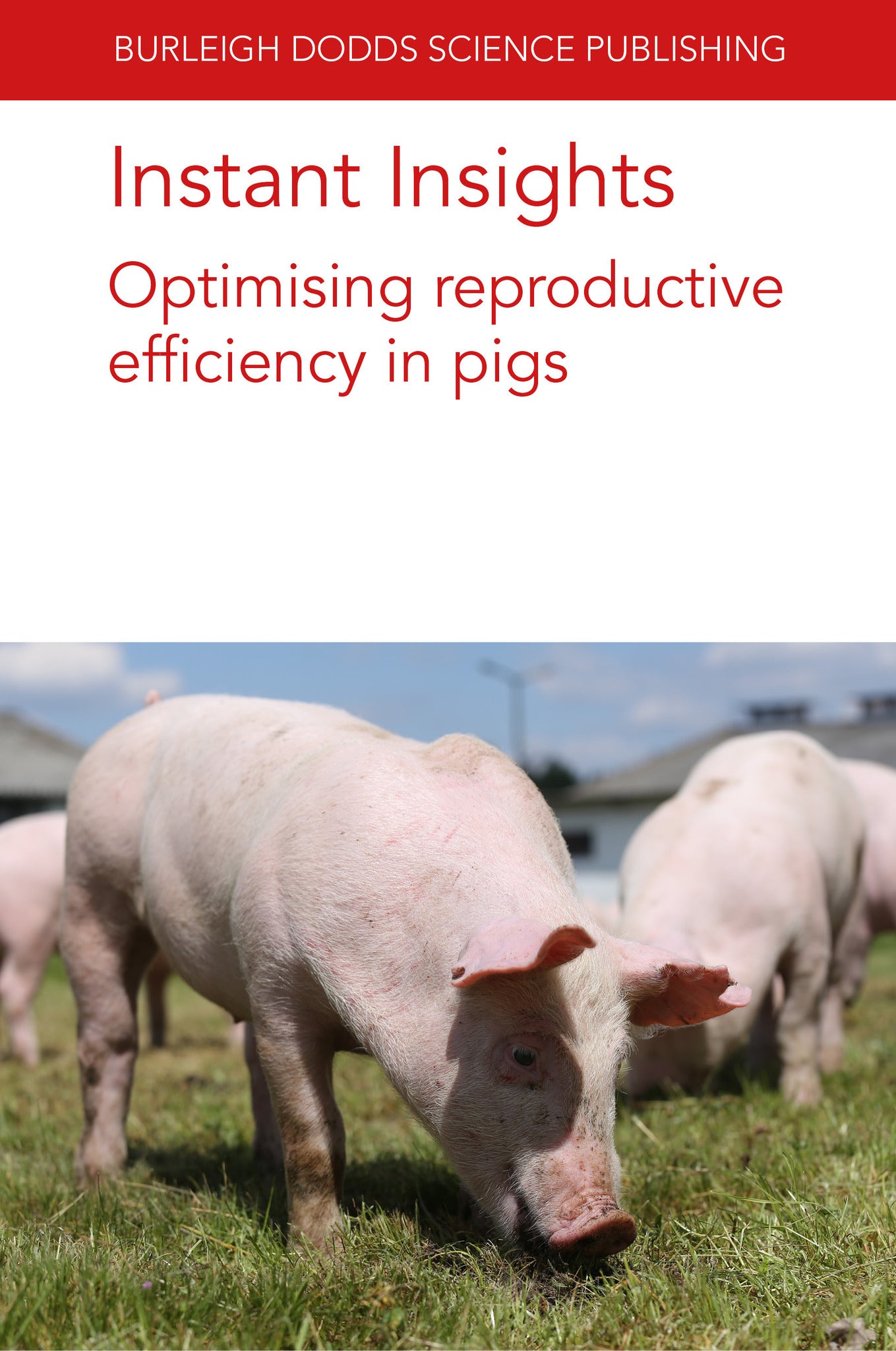We're sorry. An error has occurred
Please cancel or retry.
Instant Insights: Optimising reproductive efficiency in pigs

Some error occured while loading the Quick View. Please close the Quick View and try reloading the page.
Couldn't load pickup availability
- Format:
-
23 September 2025

This book features four peer-reviewed reviews on optimising reproductive efficiency in pigs.
The first chapter highlights some of the main factors which are known to affect reproductive efficiency in pigs, including gilt development, litter size, control of the weaning to oestrus interval and season infertility. Management strategies designed to help producers continue to make a profit are also discussed.
The second chapter introduces the concept of artificial insemination and details its importance in mitigating future challenges encountered by the global pig industry. The chapter also considers a range of factors which can affect the reproductive efficiency of boars, including low sperm count and semen quality.
The third chapter reviews the advances and trade-offs of genetic selection for improved reproductive performance in modern sows, such as an increase in piglet mortality rates. The chapter also includes informed discussions on breeding for improved conception rate, litter size and maternal behaviour.
The final chapter summarises the basic physiology of porcine female reproduction, including ovarian structure and function, folliculogenesis and steroidogenesis. It also describes stages of the porcine oestrous cycle. Further, emerging exposures and alterations to ambient temperatures and how they affect porcine female reproductive function are included.

TECHNOLOGY & ENGINEERING / Agriculture / Animal Husbandry, Animal breeding, TECHNOLOGY & ENGINEERING / Agriculture / Sustainable Agriculture, Sustainable agriculture

- Chapter 1 - Factors affecting the reproductive efficiency of pigs: Glen W. Almond and Emily Mahan-Riggs, North Carolina State University, USA;
- 1 Introduction
- 2 Gilt development, reproductive efficiency and litter size
- 3 Weaning to oestrus interval
- 4 Managing reproductive functions and fertilization
- 5 The impact of dry sow housing systems
- 6 Seasonal infertility in sow
- 7 Stockmanship and managing disease
- 8 Conclusions
- 9 Where to look for further information
- 10 References
Chapter taken from: Wiseman, J. (ed.), Achieving sustainable production of pig meat – Volume 2: Animal breeding and nutrition, Burleigh Dodds Science Publishing, Cambridge, UK, 2017, (ISBN 978 1 78676 092 0)
- Chapter 2 - Factors affecting the reproductive efficiency of boars: M. L. W. J. Broekhuijse, Topigs Norsvin Research Center B.V., The Netherlands;
- 1 Introduction
- 2 Monitoring pig fertility
- 3 Considerations when producing AI doses
- 4 Tools for AI laboratories: semen quality assessment
- 5 Conclusion
- 6 References
Chapter taken from: Wiseman, J. (ed.), Achieving sustainable production of pig meat – Volume 2: Animal breeding and nutrition, Burleigh Dodds Science Publishing, Cambridge, UK, 2017, (ISBN 978 1 78676 092 0)
- Chapter 3 - Advances in understanding the genetics of sow prolificacy: reproductive performance, trade-offs and management solutions: Glen W. Almond, North Carolina State University, USA; and Diego F. Leal, University of São Paulo, Brazil;
- 1 Introduction
- 2 Breeding for improved conception rate
- 3 Breeding for improved litter size
- 4 Selecting sows for uterine capacity
- 5 Breeding for improved maternal behavior
- 6 Concluding remarks and future trends
- 7 Where to look for more information
- 8 References
Chapter taken from: Ross, J. (ed.), Advances in pig breeding and reproduction, Burleigh Dodds Science Publishing, Cambridge, UK, 2025, (ISBN 978 1 80146 535 9)
-
Chapter 4 - Understanding ovarian function in pigs: María Estefanía González-Alvarez, Zöe E. Kiefer, Jamie M. Studer, Jason W. Ross and Aileen F. Keating, Iowa State University, USA;
- 1 Introduction
- 2 The ovary: structure and function
- 3 Follicle development: folliculogenesis
- 4 The corpus luteum
- 5 Ovarian steroidogenesis and steroid hormone changes during late gestation
- 6 The hypothalamicpituitarygonadal axis
- 7 The estrous cycle in swine
- 8 Puberty and gilt development
- 9 Environmental factors impairing swine reproduction: pesticide residues
- 10 Environmental factors impairing swine reproduction: mycotoxins
- 11 Environmental factors impairing swine reproduction: other endocrine-disrupting chemicals
- 12 Environmental factors impairing swine reproduction: heat stress
- 13 Conclusion
- 14 References
Chapter taken from: Ross, J. (ed.), Advances in pig breeding and reproduction, Burleigh Dodds Science Publishing, Cambridge, UK, 2025, (ISBN 978 1 80146 535 9)



